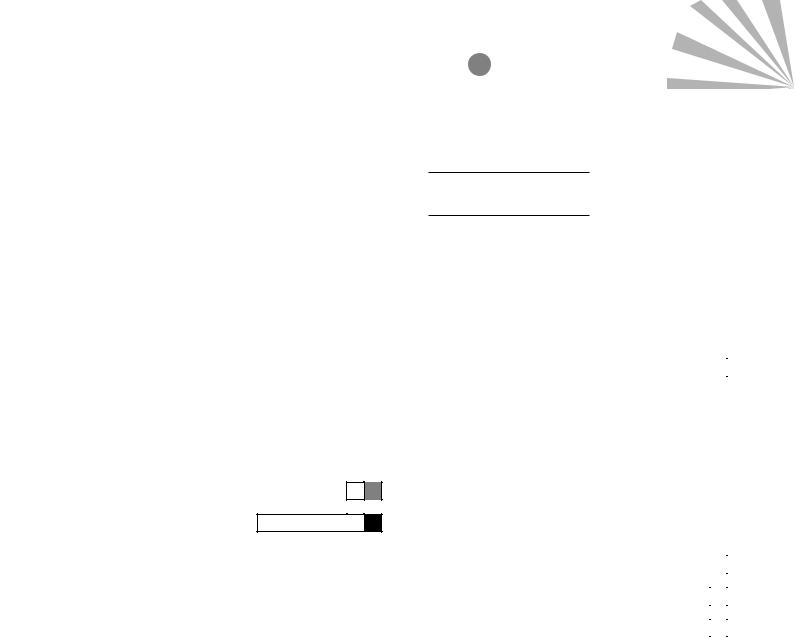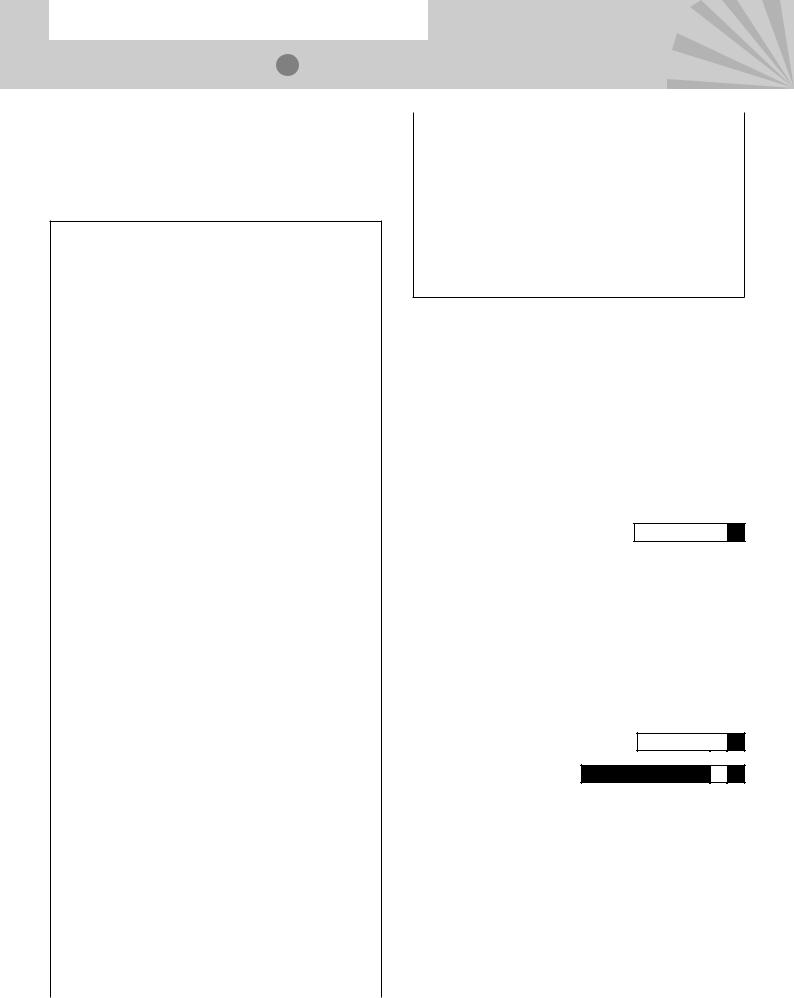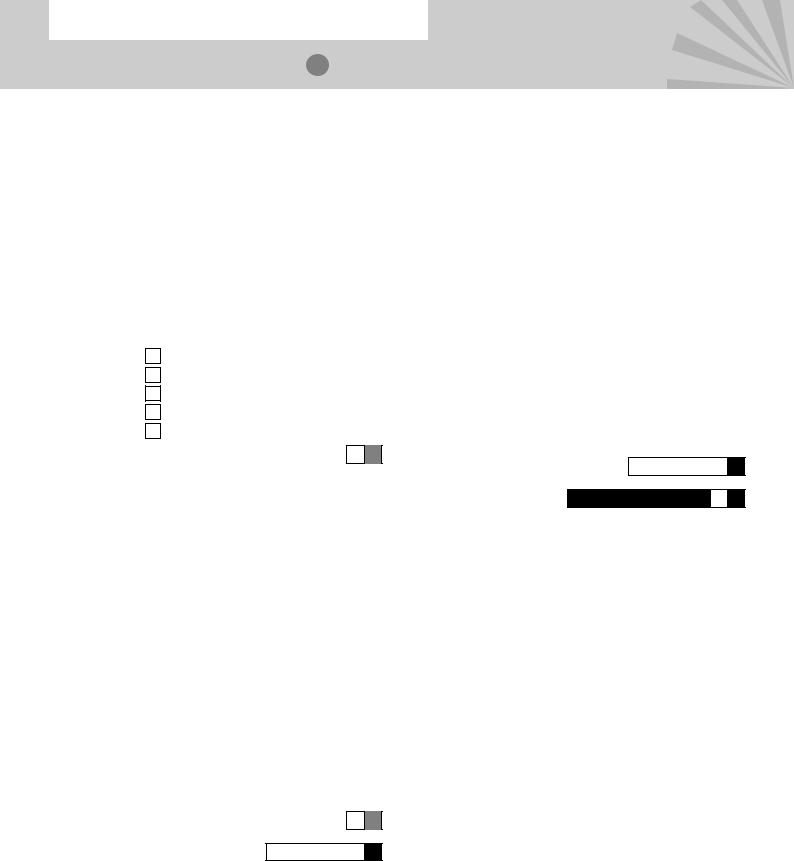
EF3e_uppint_filetest_02a
.pdf
|
NAME |
CLASS |
|
ENGLISH FILE |
|
|
|
|
|
|
2 Grammar, Vocabulary, and Pronunciation A |
|||
|
Upper-intermediate |
|||
|
|
|
|
|
GRAMMAR
1Complete the sentences with the present perfect simple or continuous form of the verbs in brackets.
Example: Have you ever had (you / ever / have) an operation?
1Karen ________ (not post) much on Facebook recently.
2I ________ (never / see) you wearing a tie!
3We’re exhausted because we ________ (garden) all day.
4How many years ________ (your parents / have) this house?
5How long ________ (you / learn) to drive?
6This is the first time I ________ (hear) Lara sing. She’s brilliant!
7We ________ (know) Ed since we first came to Liverpool.
8My internet connection ________ (go) on and off a lot today.
8
2Underline the correct word(s).
Example: In some towns there isn’t enough entertainment for young / young people.
1The Chinese / Chineses are buying more and more cars.
2We need to do more as a society to take care of elderly / the elderly.
3The French / French take a long time preparing their meals.
4Poor / The poor seem to be suffering the most from government cuts.
5The Italian / Italians have a reputation for stylish design.
6Traffic lights often make sounds to help the blinds / the blind cross the road.
6
3Order the words to make sentences.
Example: steak / like / juicy / nice / feel / I / a / big
I feel like a nice big juicy steak.
1brand / has / sports / orange / a / Jack / new / got / car / Italian
2yesterday / horrible / hat / red / wearing / a / big / what / was / Celia / !
3brother / gorgeous / had / linen / my / on / a / jacket / younger / new
4little / found / stay / hotel / lovely / we / French / a / in / to
5the / some / black / I / scarves / market / nice / at / bought / silk / very
6little / was / on / wooden / hill / beautiful / there / old / a / the / house
6
Grammar total 
 20
20
VOCABULARY
4Complete the words in the sentences.
Example: Sally doesn’t like sharing her friends. She’s very possessive.
1I keep dropping things – I seem to be very c______________ today.
2Becky can change from happy to upset for no particular reason – she’s very m___________.
3Don’t you want to do this walk? You seem very un______________.
4I don’t feel safe going out on my own. I feel very v_____________.
5Barry is so s__________. He won’t change his mind, even when he’s obviously wrong.
6Sam seems very w________. He obviously knows a lot about life.
6
5Underline the odd word out.
Example: bruise blister cough rash
1 |
sneeze |
cough |
headache |
sunburn |
|||||||
2 |
bacteria |
blister |
virus infection |
||||||||
3 |
earache |
dizzy |
faint |
pass out |
|||||||
4 |
flu a cold |
injection |
asthma |
||||||||
5 |
painkillers |
drugs |
medicine symptom |
||||||||
6 |
bleed wound |
diarrhoea |
bandage |
||||||||
|
|
|
|
|
|
|
|
|
|
||
|
|
|
|
|
|
|
|
|
6 |
|
|
English File Upper-intermediate Photocopiable © Oxford University Press 2014 |
|
|
|
|
|
|
|
|
|
|
|
|
|
|
|
|
|
|
|
|
1 |
||
|
|
|
|
|
|
|
|
|
|
|
|

|
NAME |
CLASS |
|
ENGLISH FILE |
|
|
|
|
|
|
2 Grammar, Vocabulary, and Pronunciation A |
|||
|
Upper-intermediate |
|||
|
|
|
|
|
6Underline the correct word(s).
Example: I only like natural materials – I never wear nylon / linen.
1I like that checked / striped jumper with the green and blue squares.
2I need this shirt in a bigger size – it’s too loose / tight.
3That jacket is the perfect colour – it suits / matches those trousers.
4You need some lycra / velvet shorts if you want to do some serious cycling.
5If it’s really hot tomorrow evening I’ll wear my new long-sleeved / sleeveless dress.
6We’re going shopping in 15 minutes, so get dressed / dress up!
7Lisa prefers checked / plain clothes without any pattern.
8Those shoes really go with / fit your jeans.
8
Vocabulary total 
 20
20
PRONUNCIATION
7Match the words with the same sound.
hooded allergy choking cough loose diarrhoea
Example: clothes choking
1 |
injection |
________ |
|
|
2 |
ear |
________ |
|
|
3 |
off |
________ |
|
|
4 |
boots |
________ |
|
|
5 |
woollen |
________ |
|
|
|
|
|
|
|
|
|
|
|
5 |
8 Underline the stressed syllable.
Example: co|tton |
|
|
|||
1 |
poi|son|ing |
|
|
||
2 |
head|ache |
|
|
||
3 |
fa|shio|na|ble |
|
|
||
4 |
car|di|gan |
|
|
||
5 |
un|con|scious |
|
|
||
|
|
|
|
|
|
|
|
|
|
|
5 |
|
|
|
|
|
|
|
|
|
Pronunciation total |
|
10 |
|
|
|
|
|
|
|
|
|
|
||
|
|
Grammar, Vocabulary, and Pronunciation total |
|
50 |
|
|
|
|
|
|
|
English File Upper-intermediate Photocopiable © Oxford University Press 2014 |
2 |
|
|

NAME |
CLASS |
2 Reading and Writing A
READING
Read the article about an historical discovery about fashion. Five sentences have been removed. Which sentence (A–F) fits each gap (1–5)? There is one extra sentence you do not need to use.
Stone–age Mini Skirt Discovered
For more than 40 years, fashion experts have argued over the origins of the mini skirt. Some say British designer Mary Quant came up with the design in the 1960s. (–––– 1 ––––)
And some experts even believe it made its first appearance in Hollywood ten years earlier.
But now archaeologists say the true origins of the mini skirt go back to the very beginning of civilization. They have uncovered evidence that Stone Age women were, in fact, wearing mini skirts more than 7,500 years ago. (–––– 2 ––––)
A series of stone statues wearing the prehistoric fashions were found at one of Europe’s oldest known villages. (–––– 3 ––––) The findings in this ancient village push back the origins of fashion and art in Europe by hundreds of years, to a time when our ancestors were actually just
learning about farming. ‘According to the statues we found, young women were beautifully dressed, like today’s girls,’ said archaeologist Julka Kuzmanovi´c-Cvetkovi´c.
The unnamed tribe of people lived between 5,400 and 4,700 BC in the 120-hectare site at what is now Plocnik in Serbia. Various things found at the site show us that they knew about trade, art, and how to sew. They celebrated beauty and produced 60 different forms of wonderful pottery and statues. (–––– 4 ––––) Women, it seems, have always paid attention to their appearance.
Little is known about the life of the people – known as the Vinca – who made the statues. The Vinca culture developed quickly between 5,500 and 4,000 BC in Bosnia, Serbia, Romania, and Macedonia. It got its name from the present-day village of Vinca on the Danube River near Belgrade where eight villages have been found.
The latest discoveries suggest these early farmers were more advanced than we think. The dead were buried in a tidy cemetery, houses had stoves, and there were special holes for rubbish. People slept on rugs and fur, made clothes of wool and leather, and kept animals. (–––– 5 ––––)
This is clear because some of the things found include toys, such as animals and rattles of clay, and small, badly crafted pots apparently made by children at playtime. One of the most exciting finds for archaeologists was the discovery of a sophisticated metal workshop.
ENGLISH FILE
Upper-intermediate
‘This might prove that the Copper Age started in Europe at least 500 years earlier than we thought,’ Dr Kuzmanovi´c said.
The Copper Age represents the first use of tools by humans. It is thought to have started around 4,000 BC in south-east Europe, and earlier in the Middle East. The discovery of Europe’s oldest underground mine at the nearby Mlava river suggested at the time that Vinca could be the first place in Europe to use metal, a theory which seems to be supported by the Plocnik site.
AThe trend at the time was to wear them with short tops and bracelets.
BThis community was situated between rivers, mountains, and forests in what is now southern Siberia.
CIt was first discovered in 1927.
DIt also seems that they were especially fond of children.
EHowever, others point to Frenchman André Courrèges.
FAccording to Dr Kuzmanovi´c, these not only represent the things they respected, but also things they got enjoyment from.
Reading total 
 10
10
WRITING
Write an email to your friend telling him / her about a historic place of interest in your country.
Write 140–180 words. Include the following information:
•sayhowoldtheplaceis
•describetheplace
•explainwhyyoulike/don’tliketheplace
Writing total 
 10
10
Reading and Writing total 
 20
20
English File Upper-intermediate Photocopiable © Oxford University Press 2014 |
3 |
|
|

NAME |
CLASS |
2 Listening and Speaking A
LISTENING
1Listen to five young people talking about following fashion. Choose from the list (A–F) which problem each person mentions. Use the letters only once. There is one extra letter you do not need to use.
A the cost of clothes
B the range of fashions available C the time it takes for delivery D the lack of sizes available
E clothes which are badly made F the colours available
Speaker 1:
Speaker 2:
Speaker 3:
Speaker 4:
Speaker 5:
5
2Listen to a young woman talking about setting up a fashion company and underline the correct answer.
1Anna decided to set up an online fashion company selling children’s / women’s / men’s clothes.
2Anna used money borrowed from her family / her own money / money borrowed from a friend to set up her business.
3Nowadays, Anna runs the company from her bedroom / the garage / an office.
4The speaker says the main reason for Anna’s success is because of the people she knows in the fashion industry / the support she had from her family / the long hours she spent working.
5Anna’s best piece of advice for someone who wants to go into business is to get some experience / get a qualification / do some research.
5
Listening total 
 10
10
ENGLISH FILE
Upper-intermediate
SPEAKING
1Make questions and ask your partner.
1 What kind /clothes / wear?
2 Is / important / well dressed? Why?
3 Where / buy / most / your clothes? Why?
4 What do / think / prices famous designers /charge / their clothes?
5 Do / recycle / old clothes? Why / Why not?
Now answer your partner’s questions.
2Listen to your partner talking about health. Do you agree with him / her?
3Talk about the statement below, saying if you agree or disagree. Give reasons.
‘We give too much importance to other people’s appearance – personality is more important.’
Speaking total 
 20
20
Listening and Speaking total 
 30
30
English File Upper-intermediate Photocopiable © Oxford University Press 2014 |
4 |
|
|
